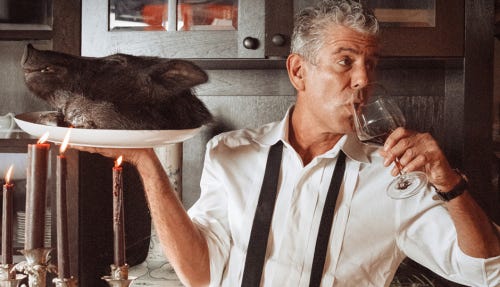The suicide of Anthony Bourdain, celebrity chef and 'foodie,' offers food for thought. Why would so apparently successful and well-liked a man suddenly hang himself in his hotel room? One can only speculate on the basis of slender evidence, and it is perhaps morally dubious to do so.
On the other hand, not to wonder about a culture in which apparently sane and mature individuals throw away their lives on impulse is also dubious. But the problem lies deeper than culture. It lies in man's fallen nature.
It is clear to me that we are, all of us, morally sick and most of us spiritually adrift. If Bourdain had a spiritual anchor, would he have so frivolously offed himself, as he apparently did?
His 1999 New Yorker essay Don't Eat Before Reading This opens as follows:
Good food, good eating, is all about blood and organs, cruelty and decay. It’s about sodium-loaded pork fat, stinky triple-cream cheeses, the tender thymus glands and distended livers of young animals. It’s about danger—risking the dark, bacterial forces of beef, chicken, cheese, and shellfish. Your first two hundred and seven Wellfleet oysters may transport you to a state of rapture, but your two hundred and eighth may send you to bed with the sweats, chills, and vomits.
This is what good eating is all about? Seriously?
Bourdain displays the requisite decadent New Yorker cleverness, but he also betrays a failure to grasp the moral side of eating and drinking. There is first of all his moral obliviousness to the questions that divide carnivores from vegetarians, an obliviousness in evidence farther down:
Even more despised than the Brunch People are the vegetarians. Serious cooks regard these members of the dining public—and their Hezbollah-like splinter faction, the vegans—as enemies of everything that’s good and decent in the human spirit. To live life without veal or chicken stock, fish cheeks, sausages, cheese, or organ meats is treasonous.
I am taking no position at the moment on the morality of meat-eating. I am merely pointing out that there is a moral question here that cannot be dismissed — especially not with the cavalier stupidity of the quotation's final sentence.
But much more important is the moral question of gluttony.
Gluttony is a vice, and therefore a habit. (Prandial overindulgence now and again does not a glutton make.) At a first approximation, gluttony is the habitual inordinate consumption of food or drink. To consume food is to process it through the gastrointestinal tract, extracting its nutrients, and reducing it to waste matter. Now suppose a man eats an excessive quantity of food and then vomits it up in order to eat some more. Has he consumed the first portion of food? Arguably not. But he is a glutton nonetheless. So I tentatively suggest the following (inclusively) disjunctive definition:
D1. Gluttony is either the habitual, quantitatively excessive consumption of food or drink, or the habitual pursuit for their own sakes of the pleasures of eating or drinking, or indeed any habitual over-concern with food, its preparation, its enjoyment, etc.
If (D1) is our definition of gluttony, the vice has not merely to do with the quantity of food eaten but with other factors as well. The following from Wikipedia:
In his Summa Theologica (Part 2-2, Question 148, Article 4), St. Thomas Aquinas reiterated the list of five ways to commit gluttony:
Laute - eating food that is too luxurious, exotic, or costly
Nimis - eating food that is excessive in quantity
Studiose - eating food that is too daintily or elaborately prepared
Praepropere - eating too soon, or at an inappropriate time
Ardenter - eating too eagerly.
It is clear that one can be a glutton even if one never eats an excessive quantity of food. The 'foody' who fusses and frets over the freshness and variety of his vegetables, wasting a morning in quest thereof, who worries about the 'virginity' of the olive oil, the presentation of the delectables on the plate, the proper wine for which course, the appropriate pre- and post-prandial liqueurs, who dissertates on the advantages of cooking with gas over electric . . . is a glutton.
In short, gluttony is the inordinate consumption of, and concern for, food and drink, where 'inordinate' does not mean merely 'quantitatively excessive.' It is also worth pointing out that there is nothing gluttonous about enjoying food: there is nothing morally wrong with enjoying the pleasures attendant upon eating nutritious, well-prepared food in the proper quantities.
Someone with a proper sense of values needn't go to the ascetic Augustinian extreme of viewing food as medicine. (This is not to say that fasting and other forms of prandial self-denial are not valuable and perhaps necessary from time to time.) One ought to think of food as fuel, albeit fuel the consumption of which is a source of legitimate pleasure.
We don't live to eat, we eat to live. And we don't live by bread (food) alone. Why not? Because we are not merely animals but spiritual animals whose life is not a merely animalic life but an embodied spiritual life.
There is something wrong with someone who becomes 'rapturous' (see initial quotation above) over Wellfleet oysters. It is spiritually obtuse so to secularize religious language. And it smacks — forgive the pun— of idolatry. Why not just enjoy your oysters without attributing to them transcendent meaning? Spiritual hunger cannot be sated in so gross a way.
Curiously, the attempt to do so is a sort of 'proof' that man is not a mere animal.
And please don't say that some piece of crud is to 'die for.'



